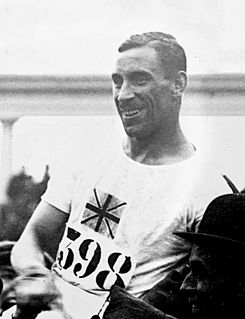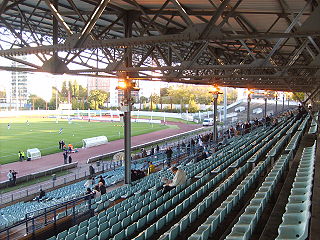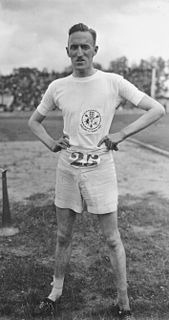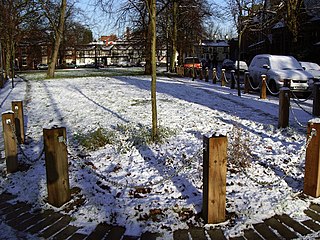
Harold Maurice Abrahams, CBE was an English track and field athlete. He was Olympic champion in 1924 in the 100 metres sprint, a feat depicted in the 1981 movie Chariots of Fire.

Vilho "Ville" Eino Ritola was a Finnish long-distance runner. Known as one of the "Flying Finns", he won five Olympic gold medals and three Olympic silver medals in the 1920s. He holds the record of winning most athletics medals in one Olympic games event - four golds and two silvers in Paris 1924. He has won the second biggest number of athletics Olympic gold medals in one event.

Eric Henry Liddell was a Scottish Olympic Gold Medalist runner, rugby union international player, and Christian missionary.

Jackson Volney Scholz was an American sprint runner. In the 1920s, he became the first person to appear in an Olympic sprint final in three different Olympic Games. After his athletic career, he also gained fame as a writer.

Douglas Gordon Arthur Lowe was a British double Olympic Games champion, winning gold medals in 1924 and 1928. On both occasions he set British 800-metres records of 1:52.4 and 1:51.8 respectively, the latter also being an Olympic record.

Albert George Hill was a British track and field athlete. He competed at the 1920 Olympics and won gold medals in the 800 m and 1500 m and a silver medal in the 3000 m team race.

David George Brownlow Cecil, 6th Marquess of Exeter, KCMG, styled Lord Burghley before 1956 and also known as David Burghley, was an English athlete, sports official, peer, and Conservative Party politician. He won the gold medal in the 400 m hurdles at the 1928 Summer Olympics.
John Thomas "Jack" Rimmer was a British athlete, winner of two gold medals at the 1900 Summer Olympics. Rimmer won the AAA Championships in 4 miles (6.4 km) in 1900. He was born in Birkdale, Merseyside.

The Stade Olympique Yves-du-Manoir is a rugby, track and association football stadium in Colombes, near Paris, France.

Sir Lancelot Carrington Royle, was a British Olympian and businessman.

Hyla Bristow Stallard, published as H. B. Stallard and familiarly known as Henry Stallard, was an English middle-distance runner and ophthalmologist.

Guy Montagu Butler was a British sprinter, winner of the gold medal in the 4 × 400 m relay at the 1920 Summer Olympics. With four Olympic medals Guy Butler shares the British record for the number of medals in athletics with Sebastian Coe and Mo Farah.

Scipio Africanus "Sam" Mussabini was an athletics coach best known for his work with Harold Abrahams. In total, he led athletes to eleven medals over five Olympic Games. However, in an era where amateurism was prized, he was not officially recognised because he was a professional coach.

Clement Nugent Jackson was a British athlete, academic and athletics administrator.
The men's 100 metres event was part of the track and field athletics programme at the 1924 Summer Olympics. This race was depicted in the film Chariots of Fire. The first two rounds were held on 6 July, with the semifinals and final on 7 July. Eighty-six sprinters from 34 countries competed.

Chariots of Fire is a 2012 stage adaptation of the 1981 Oscar-winning film of the same name. Production of the Olympic-themed play, which opened at London's Hampstead Theatre 9 May 2012 and transferred to the West End on 23 June 2012, was partially inspired by the 2012 London Summer Olympics.

Team races at the Summer Olympics were track running competitions contested at the multi-sport event from 1900 to 1924.
London Athletic Club (LAC) is a track and field club based in London, England. It is the oldest independent track and field club in the world and celebrated its first 150 years in 2013. More than sixty athletes connected with the club have since become Olympians and top athletics administrators in Britain. The club is currently based at Barn Elms, in West London.

























